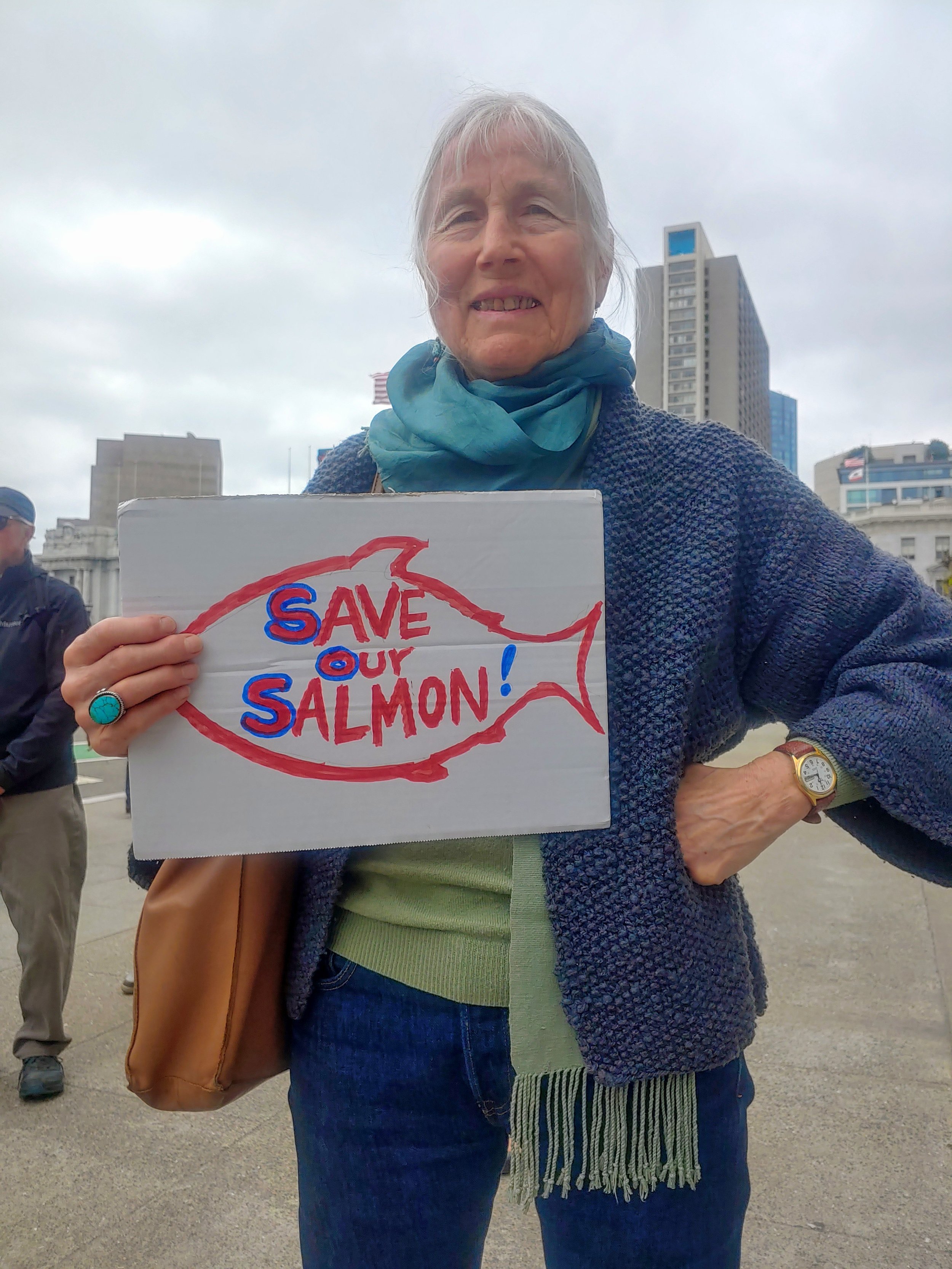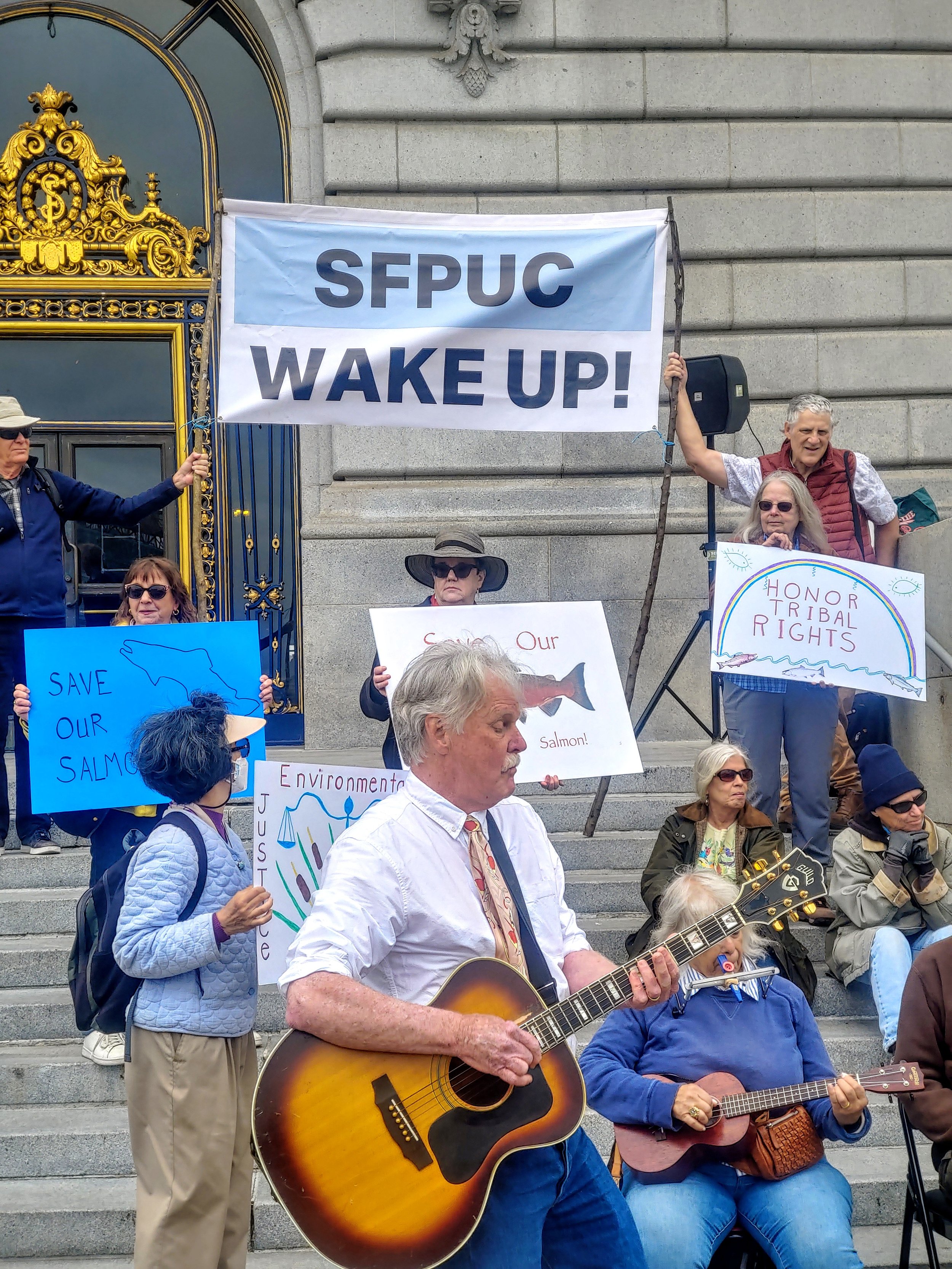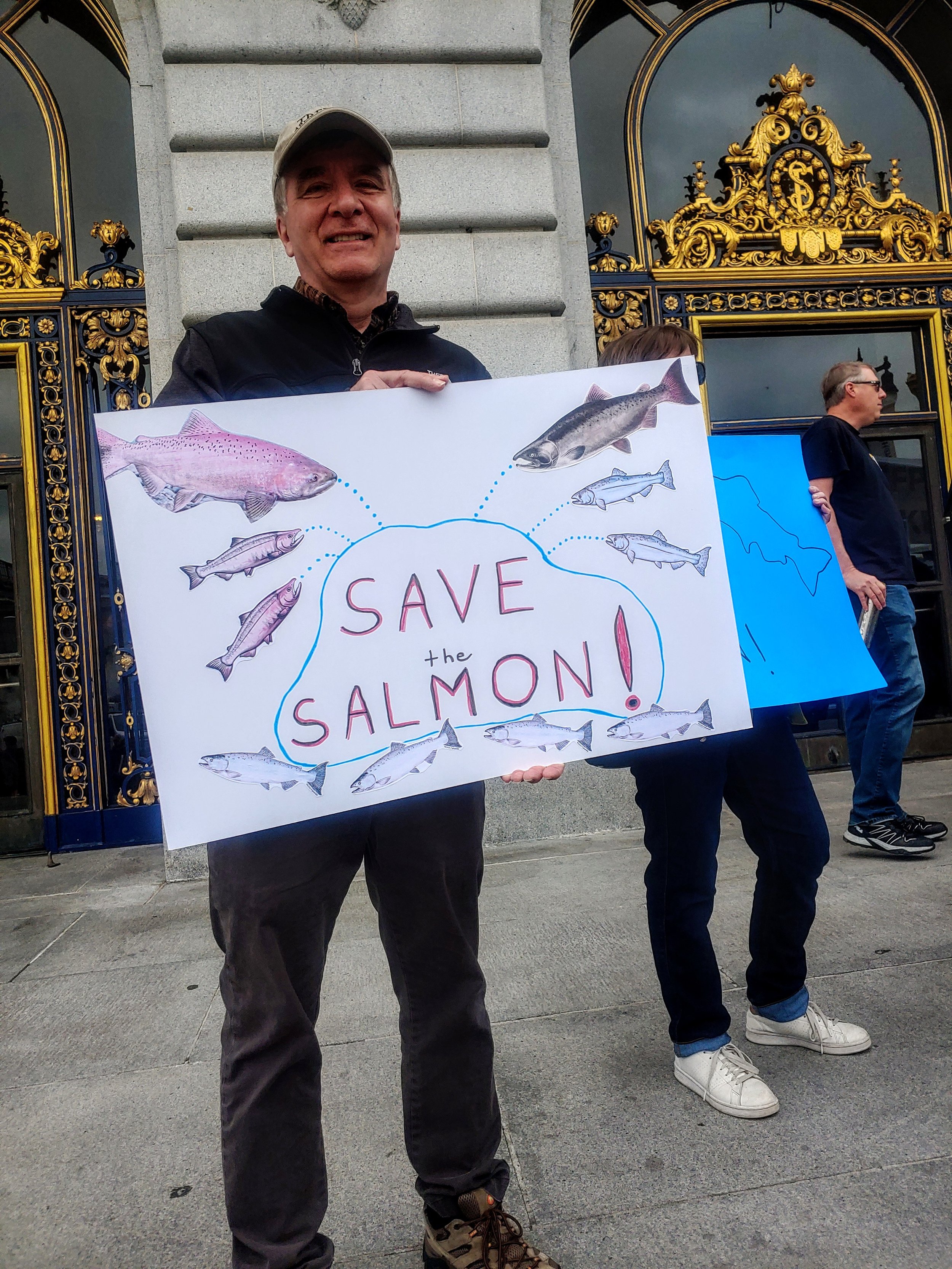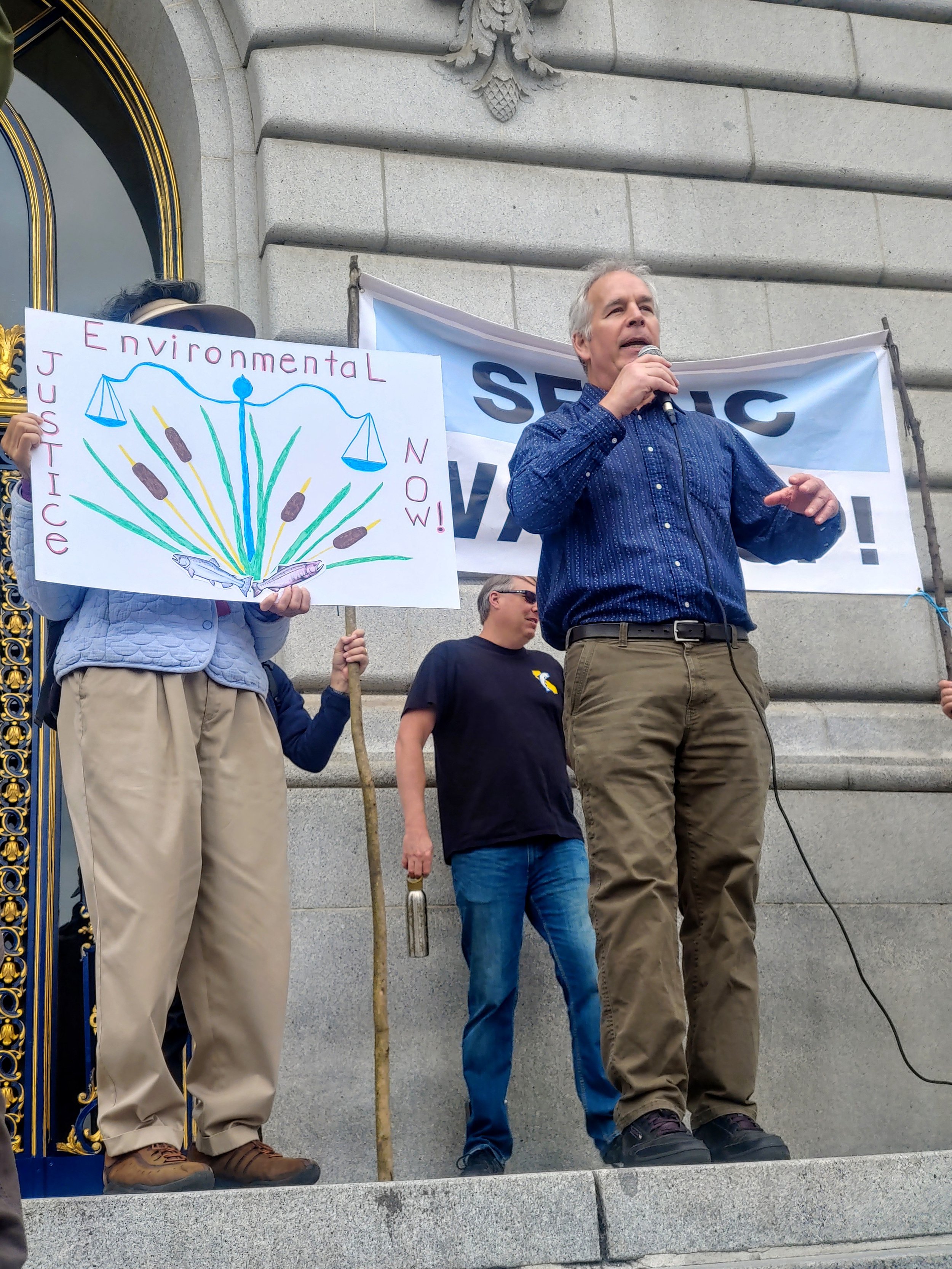Rally for the River Brings Tuolumne Advocates to SF City Hall
On a foggy, quiet Tuesday morning the dynamic Rally for the River coalition descended on the steps of San Francisco City Hall to demand action for the environment and communities adversely impacted by misguided SFPUC water policies. Protestors cheerfully brandished signs that advocated for the interconnected rights of salmon, tribes, ratepayers, and frontline communities.
Protestors proudly held signs demanding: “Save our Salmon,” “Environmental Justice Now!,” and “SFPUC Wake Up!” “Honor Tribal Rights” read a sign held by rally collaborator Mary Butterfield, who also circulated through the crowd offering festive homemade salmon (shaped) cookies. As the crowd continued to assemble, Loose Links Jug Band rallied positive energy with their upbeat, bluegrass-inspired tunes ranging from love ballads to San Francisco’s fog and sing-along versions of You Are My Sunshine.
A program of speakers took to the steps around 12:30 pm, each passionately outlining the environmental, economic, and health impacts of the SFPUC’s misguided water policies.
Peter Drekmeier, Policy Director at Tuolumne River Trust, started things off by saying, “The purpose of this rally is to demonstrate that their water policies don’t just harm the environment, but they harm people and communities, California tribes, and Delta communities. We’ve got toxic algae blooms in the Bay and Delta.”
Cintia Cortez, Policy Analyst with Restore the Delta & Delta Tribal Environmental Coalition Representative followed by illustrating the downstream impact of SFPUC’s management at San Francisco’s Hetch Hetchy Reservoir by saying, “The SFPUC contributes to excessive divergence from the Delta, supports a system that is harming marginalized communities, and has historically excluded communities of color bearing the brunt of environmental degradation and water scarcity. Although the SFPUC primarily serves the city and county of San Francisco, its water management decisions and its management of the Hetch Hetchy reservoir has impacts throughout the broader Delta ecosystem.”
Scott Artis, Executive Director of Golden State Salmon Association, pointed to declining salmon populations along the Tuolumne. A population that averaged 13,000 fall-run Chinook salmon in the 1980s has, over the past ten years, dropped to just 500 fish returning to the Tuolumne each year. This decline is also part of a statewide trend that, in recent weeks, has led to the closure of yet another commercial salmon fishing season—an emotional and economic burden to fishers and families.
Eric Buescher, Managing Attorney at San Francisco Baykeeper pointed to Baykeeper’s recent work uncovering SFPUC as the largest discharger of raw untreated sewage into the Bay. Warm weather, alongside the release of this sewage, produces excessive nutrients in the water, which fuel the harmful algal blooms mentioned by both Drekmeier and Cortez earlier. These blooms are an emerging risk—one that will become an increasing health risk for people and ecosystems alike.
Francis Mendoza of Save California Salmon rounded out the speakers with a call to sustained allyship: “What’s really important is getting together, all of us, with all of the different and myriad things we do from fishing to recreation on the river to being able to drink from the headwaters. These things are really important.”
Cintia Cortez, Policy Analyst with Restore the Delta & Delta Tribal Environmental Coalition Representative speaks at Rally for the River
As the rally wound down, more civic engagement followed; community members and coalition partners from Tuolumne River Trust, Save California Salmon, Restore the Delta, Golden State Salmon Association, Sierra Club California, Delta Tribal Environmental Coalition, San Francisco Baykeeper, San Francisco League of Conservation Voters, and Great Old Broads for Wilderness led the way into City Hall for rousing public comments at that afternoon’s SFPUC meeting.
A crowd of allies delivered public comments with a range of connected messages:
TRT supporter Dave Warner remarked that the world is shifting away from centralized water systems and that San Francisco’s infrastructure is woefully behind places like L.A. and Orange County. Nancy Arbuckle, TRT member, lamented the disconnection of choosing to live in an environmentally conscious city and looking up instead to see a dying Bay-Delta and a steady diet of misinformation from city leaders. Former TRT intern Zarine Kakalia, eloquently shared that we have two possible futures ahead of us: by 2055 we could be on track to ensure that all California salmon are extinct or the opposite could be true.
One especially young activist, Daphne Frost, said it all : “Water is Life. Fresh water flows to the ocean are valuable for fish, wildlife, and people.” Her brief but poignant statement was received with applause—even some of the Committee members joined in.
Throughout this day of civic engagement, Rally for the River urged the SFPUC to focus on sustaining human communities and ecological vitality. At a time when taxpayer water rates are set to skyrocket for San Franciscans, the SFPUC budget is on the verge of collapse, and low flows along the Tuolumne River contribute to the erosion of health for all species, the economic and ecological tipping point is now.
Stay tuned for future updates as the SFPUC’s proposed budget goes to the SF Board of Supervisors this June.
Become a monthly member of TRT to support our ongoing advocacy work.
Read the Modesto Bee coverage of Rally for the River in their article: Green Groups Protest How San Francisco uses river that runs through Modesto area.
Pacific Sun, Have SF Water Policies Led to Salmon Collapse
Watch ABC 7s clip about Rally for the River.





